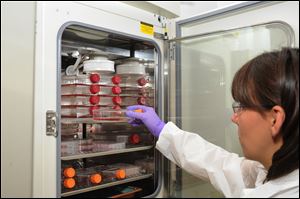
Henrietta Lacks’ descendants to speak at ONU
Woman’s cells ushered in huge medical advances but raised ethical issues
1/20/2014
A researcher places HeLa cells in an incubator at 37 degrees Celsius at a lab at the National Cancer Institute in order for them to multiply. The cancerous cells, originally taken from Henrietta Lacks in 1951 without her knowledge or consent, were the first human cells that could be grown indefinitely in a laboratory.
ADA, Ohio — It was required reading for all first-year students at Ohio Northern University this year.
On Tuesday, the university will bring to life Rebecca Skloot’s best-selling book, The Immortal Life of Henrietta Lacks, for its freshmen — and the general public — with a presentation by two descendants of Mrs. Lacks, a poor African-American woman who died in 1951 from cervical cancer at age 31.
Her cells — the first human-derived cells to grow in a laboratory — are known throughout the world as HeLa cells and have led medical researchers to develop the polio vaccine, anticancer drugs, and numerous other key discoveries. As the book explores, neither Mrs. Lacks nor her family ever gave consent for her cells to be used — nor were they compensated in any way.
LaShonda Gurley, director of multicultural development at ONU, said the story of Henrietta Lacks has wide-ranging relevance because it delves into so many different issues — from bioethics and the historical practice of experimenting on African-Americans, to medical research and pure science.
“Besides our campus community, we’re hoping to attract people from the surrounding community who are not just interested in the medical profession, but those interested in being catalysts for social justice and change,” Mrs. Gurley said, adding that the presentation coincides with the campus’ Martin Luther King, Jr., Day events.
Speaking at ONU will be Kim Lacks, a granddaughter of Mrs. Lacks, who is serving as a consultant for the Oprah Winfrey and Alan Ball production of a movie based on Mrs. Lacks’ life.
Also speaking will be Mrs. Lacks’ great-granddaughter, Veronica Spencer, who is pursuing a nursing career at John Hopkins University in Baltimore. It was at John Hopkins Hospital that Mrs. Lacks died in what was then the segregated, colored ward.
As the Lacks family states on lacksfamily.net, “we want to raise awareness and encourage action to problems the world is facing such as poverty, unemployment, racism, ethical issues, education, communication, tissue ownership. Our family is focusing on positive aspects of Henrietta’s scientific contribution to the world. The Lacks family has moved from being victims to victory of a proud family heritage.”
Kelly Shields, assistant dean in ONU’s college of pharmacy, will moderate the evening, which includes a question-and-answer session.
The presentation, free and open to the public, will begin at 7 p.m. Tuesday in the Freed Center for the Performing Arts at ONU. Kim Lacks and Miss Spencer will be available to sign copies of Ms. Skloot’s book after the presentation.
Contact Jennifer Feehan at: jfeehan@theblade.com or 419-213-2134.